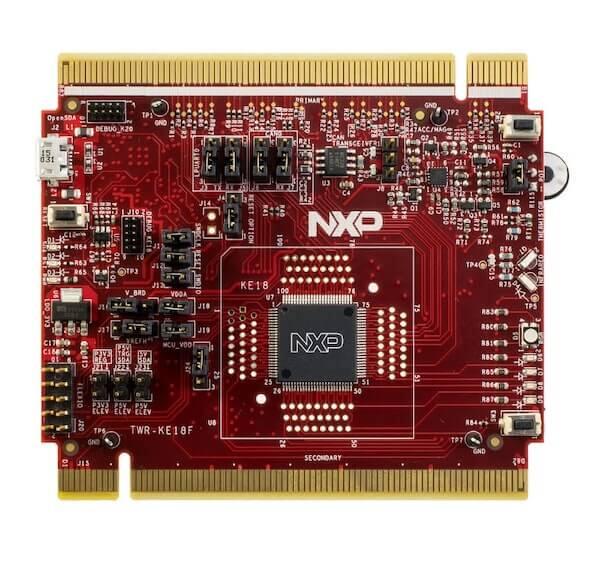NXP TWR-KE18F
Overview
The TWR-KE18F is a development board for NXP Kinetis KE1xF 32-bit MCU-based platforms. The onboard OpenSDAv2 serial and debug adapter, running an open source bootloader, offers options for serial communication, flash programming, and run-control debugging.

TWR-KE18F (Credit: NXP)
Hardware
MKE18F512VLL16 MCU (up to 168 MHz, 512 KB flash memory, 64 KB RAM, and 100 Low profile Quad Flat Package (LQFP))
3.3 V or 5 V MCU operation
6-axis FXOS8700CQ digital accelerometer and magnetometer
RGB LED
Four user LEDs
Two user push-buttons
Potentiometer
Thermistor
Infrared port (IrDA)
CAN pin header
Flex I/O pin header
For more information about the KE1xF SoC and the TWR-KE18F board, see these NXP reference documents:
Supported Features
The twr_ke18f board configuration supports the following hardware features:
Interface |
Controller |
Driver/Component |
|---|---|---|
NVIC |
on-chip |
nested vector interrupt controller |
SYSTICK |
on-chip |
systick |
PINMUX |
on-chip |
pinmux |
GPIO |
on-chip |
gpio |
UART |
on-chip |
serial port-polling; serial port-interrupt |
FLASH |
on-chip |
soc flash |
RTC |
on-chip |
rtc |
I2C(M) |
on-chip |
i2c |
SENSOR |
off-chip |
fxos8700 polling; trigger supported with H/W mods explained below; |
SPI(M) |
on-chip |
spi |
ADC |
on-chip |
adc |
CAN |
on-chip |
can |
WDT |
on-chip |
watchdog |
PWM |
on-chip |
pwm |
DAC |
on-chip |
dac |
ACMP |
on-chip |
analog comparator |
The default configuration can be found in the defconfig file:
boards/arm/twr_ke18f/twr_ke18f_defconfig.
Other hardware features are not currently supported by the port.
System Clock
The KE18 SoC is configured to use the 8 MHz external oscillator on the board with the on-chip PLL to generate a 120 MHz system clock.
Serial Port
The KE18 SoC has three UARTs. UART0 is configured for the console. The remaining UARTs are not used.
Accelerometer and magnetometer
The TWR-KE18F board by default only supports polling the FXOS8700
accelerometer and magnetometer for sensor values
(CONFIG_FXOS8700_TRIGGER_NONE=y).
In order to support FXOS8700 triggers (interrupts) the 0 ohm resistors
R47 and R57 must be mounted on the TWR-KE18F board. The
devicetree must also be modified to describe the FXOS8700 interrupt
GPIOs:
/dts-v1/;
&fxos8700 {
int1-gpios = <&gpioa 14 0>;
int2-gpios = <&gpioc 17 0>;
};
Finally, a trigger option must be enabled in Kconfig (either
FXOS8700_TRIGGER_GLOBAL_THREAD=y or
FXOS8700_TRIGGER_OWN_THREAD=y).
Programming and Debugging
Build and flash applications as usual (see Building an Application and Run an Application for more details).
Configuring a Debug Probe
A debug probe is used for both flashing and debugging the board. This board is configured by default to use the OpenSDA DAPLink Onboard Debug Probe.
Early versions of this board have an outdated version of the OpenSDA bootloader and require an update. Please see the DAPLink Bootloader Update page for instructions to update from the CMSIS-DAP bootloader to the DAPLink bootloader.
Option 1: OpenSDA DAPLink Onboard Debug Probe (Recommended)
Install the pyOCD Debug Host Tools and make sure they are in your search path.
Follow the instructions in OpenSDA DAPLink Onboard Debug Probe to program the OpenSDA DAPLink TWR-KE18F Firmware.
Option 2: OpenSDA J-Link Onboard Debug Probe
Install the J-Link Debug Host Tools and make sure they are in your search path.
Follow the instructions in OpenSDA J-Link Onboard Debug Probe to program the OpenSDA J-Link Firmware for TWR-KE18F.
Add the arguments -DBOARD_FLASH_RUNNER=jlink and
-DBOARD_DEBUG_RUNNER=jlink when you invoke west build to override the
default runner from pyOCD to J-Link:
# From the root of the zephyr repository
west build -b twr_ke18f samples/hello_world -- -DBOARD_FLASH_RUNNER=jlink -DBOARD_DEBUG_RUNNER=jlink
Configuring a Console
Regardless of your choice in debug probe, we will use the OpenSDA microcontroller as a usb-to-serial adapter for the serial console.
Connect a USB cable from your PC to J2.
Use the following settings with your serial terminal of choice (minicom, putty, etc.):
Speed: 115200
Data: 8 bits
Parity: None
Stop bits: 1
Flashing
Here is an example for the Hello World application.
# From the root of the zephyr repository
west build -b twr_ke18f samples/hello_world
west flash
Open a serial terminal, reset the board (press the SW1 button), and you should see the following message in the terminal:
***** Booting Zephyr OS v1.14.0-xxx-gxxxxxxxxxxxx *****
Hello World! twr_ke18f
Debugging
Here is an example for the Hello World application.
# From the root of the zephyr repository
west build -b twr_ke18f samples/hello_world
west debug
Open a serial terminal, step through the application in your debugger, and you should see the following message in the terminal:
***** Booting Zephyr OS v1.14.0-xxx-gxxxxxxxxxxxx *****
Hello World! twr_ke18f
